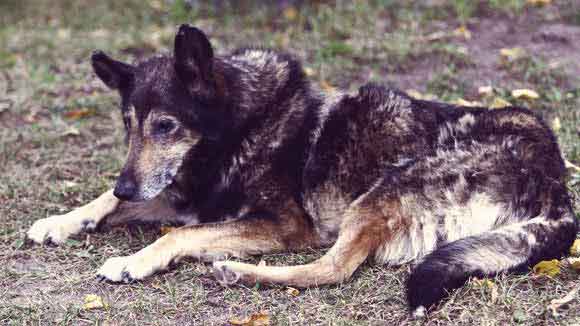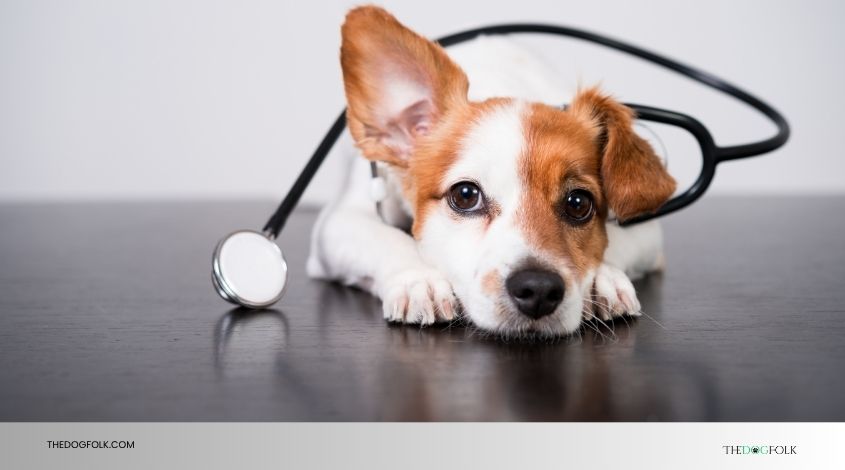Last Updated on September 24, 2025 by Emily Hartman
Imagine coming home after a long day, greeted by your dog’s wagging tail and cheerful bark. It’s one of life’s simple joys, but as a loving pet owner, there’s more to consider than just these happy moments.
Your dog’s health is a top priority, and sometimes, subtle signs of trouble can go unnoticed. Wouldn’t it be reassuring to know what to look out for? In this guide, “Dog Health Checklist: Signs You Should Never Ignore,” you’ll discover essential tips to ensure your furry friend stays in peak condition.
By staying informed, you can prevent minor issues from becoming major concerns. So, are you ready to learn how to be your dog’s health advocate? Dive in to uncover the signs that every dog owner should be aware of. Your pet’s wellbeing could depend on it.
Contents
Common Health Symptoms
Spot unusual behavior in dogs with a reliable health checklist. Watch for signs like lethargy, appetite loss, or unusual lumps. Early detection can ensure your pet’s well-being and prevent severe health issues.
When it comes to caring for your furry friend, understanding common health symptoms is crucial. Dogs, like humans, can sometimes show subtle signs of discomfort or illness. By being aware of these signs, you can ensure your pet stays healthy and happy. This section highlights some symptoms you should never ignore.
Unusual Lethargy
Have you noticed your usually energetic pup seems more tired than usual? It’s normal for dogs to have off days, but persistent lethargy could indicate something more serious. Consider if there has been a change in routine or environment. If not, it might be time to consult your vet.
Changes In Appetite
A sudden change in eating habits can be a red flag. Whether your dog is eating less or showing unusual hunger, it’s essential to observe these changes. Sometimes, stress or a minor illness can affect appetite, but a persistent change might point to underlying health issues.
Persistent Coughing Or Sneezing
Occasional coughing or sneezing is normal, but persistent episodes are not. Think of it as your dog trying to tell you something is not right. It could be allergies, or something more serious like kennel cough. Take note of how often it happens and consult your vet if it persists.
Vomiting Or Diarrhea
These symptoms are among the most common reasons pet owners rush to the vet. While a single episode might not be concerning, frequent occurrences can lead to dehydration. Ask yourself if your dog has recently eaten something unusual. If symptoms continue, it’s best to seek professional advice.
Unexplained Weight Loss Or Gain
Weight fluctuations can be more than just dietary issues. Unexplained weight loss might indicate a problem with your dog’s metabolism. Conversely, sudden weight gain can lead to other health concerns. Monitor your dog’s weight regularly and consult a vet if you notice significant changes.
Difficulty Breathing
Breathing difficulties should never be ignored. Whether it’s panting heavily without exercise or wheezing, this symptom requires immediate attention. Breathing problems can be life-threatening, so act promptly. Is your pet in a hot environment? Move them to a cooler area and contact your vet. Staying informed and observant can make a world of difference for your dog’s health. By recognizing these symptoms early, you can take swift action and potentially save your furry friend from more serious health issues. What signs have you noticed in your dog lately that might need a second look?

Credit: www.petcarerx.com
Behavioral Changes
Dogs communicate their feelings through behavior. Understanding behavioral changes is crucial for dog health. Sudden shifts often indicate underlying issues. Observing these changes helps in addressing potential health problems early.
Signs Of Aggression
If your dog becomes aggressive, it may be feeling unwell. Aggression can stem from pain or fear. Watch for growling or snapping. These are signs to consult a vet.
Loss Of Interest
Dogs usually enjoy playtime. A sudden lack of interest can signal health issues. If your dog ignores toys or activities, it might be suffering. Monitor its behavior closely.
Excessive Barking Or Whining
Barking is normal, but excessive barking might indicate distress. Whining can be a sign of discomfort or anxiety. Pay attention to changes in vocal patterns.
Changes In Eating Habits
Eating habits reflect health. A sudden increase or decrease in appetite is concerning. If your dog refuses food, it might be unwell. Changes in diet need vet attention.
Unusual Sleep Patterns
Dogs sleep a lot, but sudden changes in sleep patterns are noteworthy. Sleeping too much or too little can point to a health issue. Observe your dog’s sleep routine closely.
Physical Condition Indicators
Understanding your dog’s physical condition is crucial for maintaining their health. Just like us, dogs show signs when something isn’t quite right. Recognizing these indicators can prevent small issues from turning into major health problems. Let’s dive into the specifics that you should keep an eye on.
Weight Fluctuations
Is your dog gaining or losing weight unexpectedly? Sudden weight changes can signal underlying health issues. If your dog seems heavier or lighter, it might be time to consult your vet.
Monitoring your dog’s weight is simple. Use a scale and track it monthly. Compare it with their usual weight range. It’s a straightforward way to catch potential health concerns early.
Coat And Skin Condition
Your dog’s coat and skin reveal a lot about their health. A shiny coat generally indicates good health. But dull fur or excessive shedding might hint at problems.
When petting your dog, notice any bumps or dry patches. These can be signs of allergies or skin infections. Regular grooming can help you spot these issues quickly.
Energy Levels
Have you noticed any changes in your dog’s energy levels? A normally active dog becoming lethargic could be a red flag. Conversely, a calm dog suddenly hyperactive might also indicate health changes.
Keep track of your dog’s daily routines. Are they playing less or sleeping more? These changes can help you catch health issues early.
Breathing Patterns
Watch your dog’s breathing. Rapid breathing or wheezing can be signs of respiratory issues. Normal breathing should be smooth and steady.
If your dog seems to struggle with breathing during rest, it’s worth discussing with your vet. Breathing irregularities can be crucial indicators of health problems.
Posture And Mobility
Is your dog moving differently? Limping or stiffness might mean joint issues or injuries. Dogs are active creatures, and changes in their movement can tell you a lot.
Observe your dog when they walk or run. Any unusual posture or reluctance to move needs attention. Early detection can prevent chronic conditions.
By paying attention to these physical condition indicators, you can ensure your dog stays happy and healthy. Remember, small changes can be significant. Are you regularly checking your dog’s health? What signs have you noticed lately?

Credit: dvmguam.com
Routine Health Checks
Routine health checks are vital for your dog’s well-being. Regular visits to the vet help monitor your dog’s health. Early detection of problems can save your dog from serious issues. Frequent checks keep your furry friend healthy and happy. Understand the importance of routine health checks. Know what signs to watch for.
Check For Fleas And Ticks
Fleas and ticks can cause irritation and disease. Examine your dog’s skin regularly. Look for small bumps or red spots. These may indicate flea bites. Ticks can lead to Lyme disease. It’s crucial to remove them quickly. Use a special comb for easy detection. Check under the collar and in the ears.
Monitor Your Dog’s Weight
Weight changes can signal health issues. Weigh your dog often to track weight. Sudden weight gain can mean health problems. Weight loss might indicate illness. Discuss any unusual weight changes with your vet. Proper diet is essential for maintaining a healthy weight.
Observe Your Dog’s Behavior
Behavior changes can be a sign of health issues. Notice if your dog seems lethargic or anxious. Check for signs of aggression or withdrawal. Monitor your dog’s sleeping patterns. Sleeping too much or too little can indicate a problem. Keep notes on any changes to discuss with your vet.
Examine Your Dog’s Coat
A healthy coat is shiny and smooth. Dull or thinning fur can indicate a health issue. Regular brushing helps maintain coat health. Look for bald spots or excessive shedding. These could signal skin problems or allergies. Ensure your dog gets proper nutrition for a healthy coat.
Inspect Your Dog’s Eyes
Clear eyes indicate good health. Check for redness or discharge. These symptoms might mean an infection. Observe if your dog rubs their eyes often. This could indicate irritation. Keep your dog’s eyes clean and watch for changes. Regular eye exams help catch issues early.
Frequently Asked Questions
What Are Common Signs Of Dog Illness?
Watch for loss of appetite, lethargy, vomiting, or diarrhea. Also, changes in behavior or breathing.
How Do I Know If My Dog Is In Pain?
Look for limping, whimpering, or reluctance to move. Dogs may also hide or act aggressively.
Why Is My Dog Suddenly Losing Weight?
Sudden weight loss can signal health issues. Possible causes include parasites, diabetes, or digestive problems.
Is Coughing In Dogs A Serious Issue?
Yes, it can be. Coughing might indicate respiratory infections, heart disease, or kennel cough. Consult a vet.
When Should I Worry About My Dog’s Vomiting?
Frequent vomiting or blood in vomit needs a vet. Occasional vomiting might not be serious but still monitor.
Conclusion
Caring for your dog’s health is crucial. Spotting early signs saves lives. Trust your instincts as a pet owner. Observe changes in behavior or appetite. Always consult a vet for concerns. Regular check-ups keep your dog healthy. A healthy dog means a happy home.
Stay informed about common ailments. Your pet’s wellbeing depends on your vigilance. Love and care go a long way in pet health. Never ignore unusual symptoms. Take immediate action to ensure your dog’s safety. Prioritize your dog’s health and enjoy a long, happy life together.

Emily Hartman is a lifelong dog lover, writer, and canine care enthusiast. With years of experience in pet parenting and a deep passion for helping others raise happy, healthy dogs, she shares practical tips, thoughtful advice, and product recommendations to make life better for pups and their people. When she’s not writing, you’ll find her hiking with her rescue lab, Milo, or exploring new dog-friendly spots around town.

